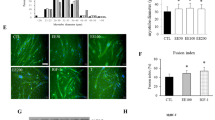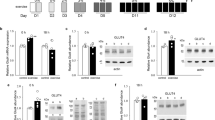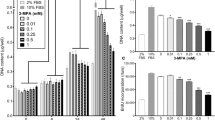Abstract
OBJECTIVE: To increase the understanding of the transcriptional regulation of UCP2 gene expression in skeletal muscle cells, we examined the effect of all-trans-retinoic acid (tRA), a ligand (after the conversion to 9-cis-RA) of the retinoid X receptor (RXR), and linolenic acid, a polyunsaturated fatty acid and peroxisome proliferator-activated receptors (PPARs) ligand, on the expression of UCP2 mRNA in cultured L6 myotubes.
RESEARCH METHODS AND PROCEDURES: UCP2 gene expression in L6 myotubes was confirmed by Northern blot analysis. The time- and concentration-dependency of tRA and linolenic acid on UCP2 gene expression was assessed by dot blot quantification. The mRNA levels of PPAR subtypes (α, γ and δ) were determined by RT-PCR.
RESULTS: tRA induced UCP2 gene expression in a time- and concentration-dependent manner. Similar to tRA, UCP2 mRNA was markedly increased by 0.5 mM linolenic acid. In L6 myotubes, PPARδ mRNA was abundant, whereas PPARα mRNA was lower and PPARγ mRNA was minimal.
CONCLUSIONS: UCP2 mRNA expression in L6 myotubes is up-regulated by tRA and linolenic acid, possibly through a mechanism involving PPAR and RXRs.
This is a preview of subscription content, access via your institution
Access options
Subscribe to this journal
Receive 12 print issues and online access
$259.00 per year
only $21.58 per issue
Buy this article
- Purchase on Springer Link
- Instant access to full article PDF
Prices may be subject to local taxes which are calculated during checkout






Similar content being viewed by others
References
Fleury C, Neverova M, Collins S, Raimbault S, Champigny O, Levi-Meyrueis C, Bouillaud F, Seldin MF, Surwit RS, Ricquier D, Warden CH . Uncoupling protein-2: a novel gene linked to obesity and hyperinsulinemia Nature Genet 1997 15: 269–272.
Jaburek M, Varecha M, Gimeno RE, Dembski M, Jezek P, Zhang M, Burn P, Tartaglia LA, Garlid KD . Transport function and regulation of mitochondrial uncoupling protein 2 and 3 J Biol Chem 1999 274: 26003–26007.
Zhang C-Y, Hagen T, Mootha VK, Slieker LJ, Lowell BB . Assessment of uncoupling activity of uncoupling protein 3 using a yeast heterologous expression system FEBS Lett 1999 449: 129–134.
Larkin S, Mull E, Miao W, Pittner R, Albrandt K, Moore C, Young A, Denaro M, Beaumont K . Regulation of the third member of the uncoupling protein family, UCP3, by cold and thyroid hormone Biochem Biophys Res Commun 1997 240: 222–227.
Millet L, Vidal H, Andreelli F, Larrouy D, Riou J-P, Ricquier D, Laville M, Langin D . Increased uncoupling protein-2 and -3 mRNA expression during fasting in obese and lean humans J Clin Invest 1997 100: 2665–2670.
Boss O, Samec S, Kuhne F, Bijlenga P, Assimacopoulos-Jeannet F, Seydoux J, Giacobino J-P, Muzzin P . Uncoupling protein-3 expression in rodent skeletal muscle is modulated by food intake but not by changes in environmental temperature J Biol Chem 1998 273: 5–8.
Tsuboyama-Kasaoka N, Tsunoda N, Maruyama K, Takahashi M, Kim H, Ikemoto S, Ezaki O . Up-regulation of uncoupling protein 3 (UCP3) mRNA by exercise training and down-regulation of UCP3 by denervation in skeletal muscles Biochem Biophys Res Commun 1998 247: 498–503.
Weigle DS, Selfridge LE, Schwartz MW, Seeley RJ, Cummings DE, Havel PJ, Kuijper JL, BeltrandelRio H . Elevated free fatty acids induce uncoupling protein 3 expression in muscle Diabetes 1998 47: 298–302.
Surwit RS, Wang S, Petro AE, Sanchis D, Raimbault S, Ricquier D, Collins S . Diet-induced changes in uncoupling proteins in obesity-prone and obesity-resistant strains of mice Proc Natl Acad Sci USA 1998 95: 4061–4065.
Hwang C-S, Lane MD . Up-regulation of uncoupling protein-3 by fatty acid in C2C12 myotubes Biochem Biophys Res Commun 1999 258: 464–469.
Boss O, Samec S, Paoloni-Giacobino A, Rossier C, Dulloo A, Seydoux J, Muzzin P, Giacobino J-P . Uncoupling protein-3: a new member of the mitochondrial carrier family with tissue-specific expression FEBS Lett 1997 408: 39–42.
Gong D-W, He Y, Karas M, Reitman M . Uncoupling protein-3 is a mediator of thermogenesis regulated by thyroid hormone, β 3-adrenergic agonists, and leptin J Biol Chem 1997 272: 24129–24132.
Boss O, Samec S, Desplanches D, Mayet M-H, Seydoux J, Muzzin P, Giacobino J-P . Effect of endurance training on mRNA expression of uncoupling proteins 1, 2, and 3 in the rat FASEB J 1998 12: 335–339.
Moffett DF, Moffett SB, Schauf CL . In: Smith JM (ed). Human physiology foundations and frontiers. Mosby-Year Book: St Louis, MO 1993
Nagase I, Yoshida S, Canas X, Irie Y, Kimura K, Yoshida T, Saito M . Up-regulation of uncoupling protein 3 by thyroid hormone, peroxisome proliferator-activated receptor ligands and 9-cis retinoic acid in L6 myotubes FEBS Lett 1999 461: 319–322.
Shimokawa T, Kato M, Watanabe Y, Hirayama R, Kurosaki E, Shikama H, Hashimoto S . In vivo effects of pioglitazone on uncoupling protein-2 and -3 mRNA levels in skeletal muscle of hyperglycemic KK mice Biochem Biophys Res Commun 1998 251: 374–378.
Roche E, Buteau J, Aniento I, Reig JA, Soria B, Prentki M, Palmitate . and oleate induce the immediate-early response genes c-fos and nur-77 in the pancreatic β-cell line INS-1 Diabetes 1999 48: 2007–2014.
Chomczynski P, Sachhi N . Single step method of RNA isolation by acid guanidinium thiocyanate-phenol-chloroform extraction Anal Biochem 1987 162: 156–159.
Scarpace PJ, Matheny M, Borst SE, Tümer N . Thermoregulation with age: role of thermogenesis and uncoupling protein expression in brown adipose tissue Proc Soc Exp Biol Med 1994 205: 154–161.
Nordfors L, Hoffstedt J, Nyberg B, Thorne A, Arner P, Schalling M, Lonnqvist F . Reduced gene expression of UCP2 but not UCP3 in skeletal muscle of human obese subjects Diabetologia 1998 41: 935–939.
Berraondo B, Marti A, Duncan JS, Trayhurn P, Martinez JA . Up-regulation of muscle UCP2 gene expression by a new beta3-adrenoceptor agonist, trecadrine, in obese (cafeteria) rodents, but down-regulation in lean animals Int J Obes Relat Metab Disord 2000 24: 156–163.
Barnett D, Craig JG, Robinson DS, Rogers MP . Effect of clofibrate on glucose tolerance in maturity onset diabetes Br J Clin Pharmac 1977 4: 455–458.
Camirand A, Marie V, Rabelo R, Silva JE . Thiazolidinediones stimulate uncoupling protein-2 expression in cell lines representing white and brown adipose tissues and skeletal muscle Endocrinology 1998 139: 428–431.
Cabrero À, Alegret M, Sánchez RM, Adzet T, Laguna JC, Vázquez M . Down-regulation of uncoupling protein-3 and -2 by thiazolidinediones in C2C12 myotubes FEBS Lett 2000 484: 37–42.
Mangelsdorf DJ, Evans RM . The RXR heterodimers and orphan receptors Cell 1995 83: 841–850.
Schoonjans K, Staels B, Auwerx J . The peroxisome proliferator activated receptors (PPARs) and their effects on lipid metabolism and adipocyte differentiation Biochim Biophys Acta 1996 1302: 93–109.
Spiegelman BM . PPAR-γ: adipogenic regulator and thiazolidinedione receptor Diabetes 1998 47: 507–514.
Sporn MB, Roberts AB, Goodman WS (eds) . The retinoids: biology, chemistry, and medicine. Raven Press: New York 1994
Petkovich M, Brand NJ, Krust A, Chambon P . A human retinoic acid receptor which belongs to the family of nuclear receptors Nature 1987 330: 444–450.
Evans RM . The steroid and thyroid hormone receptor superfamily Science 1988 240: 889–895.
Mangelsdorf DJ, Ong ES, Dyck JA, Evans RM . Nuclear receptor that identifies a novel retinoic acid response pathway Nature 1990 345: 224–229.
Forman BM, Chen J, Evans RM . Hypolipidemic drugs, polyunsaturated fatty acids, and eicosanoids are ligands for peroxisome proliferator-activated receptors α and δ Proc Natl Acad Sci USA 1997 94: 4312–4317.
Acknowledgements
We are grateful to Mike Matheny for skillful technical assistance. We also thank Shigeru Takeshita for his special support in RT-PCR. This work was supported by the Medical Research Service of the Department of Veterans Affairs and National Institute on Aging Grant AG-17047.
Author information
Authors and Affiliations
Corresponding author
Rights and permissions
About this article
Cite this article
Hatakeyama, Y., Scarpace, P. Transcriptional regulation of uncoupling protein-2 gene expression in L6 myotubes. Int J Obes 25, 1619–1624 (2001). https://doi.org/10.1038/sj.ijo.0801812
Received:
Revised:
Accepted:
Published:
Issue Date:
DOI: https://doi.org/10.1038/sj.ijo.0801812



